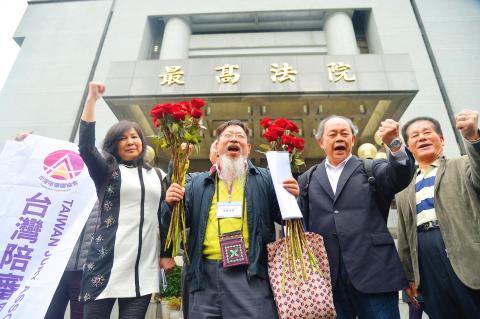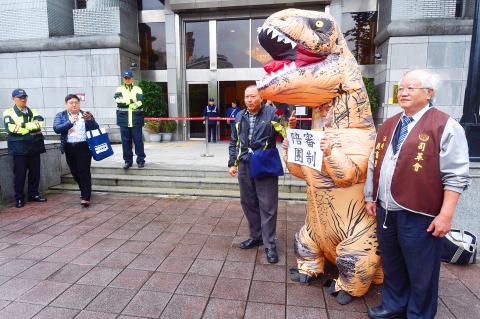Taiwan Jury Association chairman Chang Ching (張靜) yesterday presented officials at the fourth subcommittee meeting of the national conference on judicial reform at the Supreme Court in Taipei with red roses before a discussion on how to implement a jury system.
Chang, a former judge who quit but continued to practice law as an attorney, wanted to draw attention to his case, enabling effective participation and input by citizens in the judicial process through a jury system.
His move was apparently mocking Judicial Yuan President Hsu Zhong-li (許宗力), who has led conservative forces within the judiciary to oppose a jury system, saying: “Pushing for a jury system in Taiwan is like trying to grow roses in the desert.”

Photo: CNA
“What Hsu does not know is that there are actually species of roses that can grow in the desert,” Chang said at the meeting in the afternoon.
“In the years to come, no matter if we get a jury system or a more limited way for citizens to participate in the judicial process, there will be major changes and effects. For any of these options, there are positive and negative aspects, including for the current system of court rulings by professional judges,” he said.
“What we do know is that the current system has resulted in 80 percent of the public not trusting our judicial system,” Chang said.

Photo: George Tsorng
He handed a rose to each subcommittee member, including judges, saying: “We hope the red rose can symbolize a sacred flower that can break the curse on the judicial system.”
“The jury system can help to preserve the impartiality of the courts. It can separate the distinct duties of jurors and judges,” Judicial Reform Foundation executive director Kao Jung-chih (高榮志) said.
“That way, judges would not be encumbered in criminal cases. The public could also effectively participate in the judicial process, allowing them to better relate to it,” Kao added.
Former grand justice Hsu Yu-hsiu (許玉秀) cited the results of a survey, which showed that many people have difficulty comprehending court rulings.
She and other members recommended that rulings by judges and judicial documents be written in plain language to make it easier for average citizens to better understand them.

A preclearance service to facilitate entry for people traveling to select airports in Japan would be available from Thursday next week to Feb. 25 at Taiwan Taoyuan International Airport, Taoyuan International Airport Corp (TIAC) said on Tuesday. The service was first made available to Taiwanese travelers throughout the winter vacation of 2024 and during the Lunar New Year holiday. In addition to flights to the Japanese cities of Hakodate, Asahikawa, Akita, Sendai, Niigata, Okayama, Takamatsu, Kumamoto and Kagoshima, the service would be available to travelers to Kobe and Oita. The service can be accessed by passengers of 15 flight routes operated by

Alain Robert, known as the "French Spider-Man," praised Alex Honnold as exceptionally well-prepared after the US climber completed a free solo ascent of Taipei 101 yesterday. Robert said Honnold's ascent of the 508m-tall skyscraper in just more than one-and-a-half hours without using safety ropes or equipment was a remarkable achievement. "This is my life," he said in an interview conducted in French, adding that he liked the feeling of being "on the edge of danger." The 63-year-old Frenchman climbed Taipei 101 using ropes in December 2004, taking about four hours to reach the top. On a one-to-10 scale of difficulty, Robert said Taipei 101

Taiwanese and US defense groups are collaborating to introduce deployable, semi-autonomous manufacturing systems for drones and components in a boost to the nation’s supply chain resilience. Taiwan’s G-Tech Optroelectronics Corp subsidiary GTOC and the US’ Aerkomm Inc on Friday announced an agreement with fellow US-based Firestorm Lab to adopt the latter’s xCell, a technology featuring 3D printers fitted in 6.1m container units. The systems enable aerial platforms and parts to be produced in high volumes from dispersed nodes capable of rapid redeployment, to minimize the risk of enemy strikes and to meet field requirements, they said. Firestorm chief technology officer Ian Muceus said

MORE FALL: An investigation into one of Xi’s key cronies, part of a broader ‘anti-corruption’ drive, indicates that he might have a deep distrust in the military, an expert said China’s latest military purge underscores systemic risks in its shift from collective leadership to sole rule under Chinese President Xi Jinping (習近平), and could disrupt its chain of command and military capabilities, a national security official said yesterday. If decisionmaking within the Chinese Communist Party has become “irrational” under one-man rule, the Taiwan Strait and the regional situation must be approached with extreme caution, given unforeseen risks, they added. The anonymous official made the remarks as China’s Central Military Commission Vice Chairman Zhang Youxia (張又俠) and Joint Staff Department Chief of Staff Liu Zhenli (劉振立) were reportedly being investigated for suspected “serious